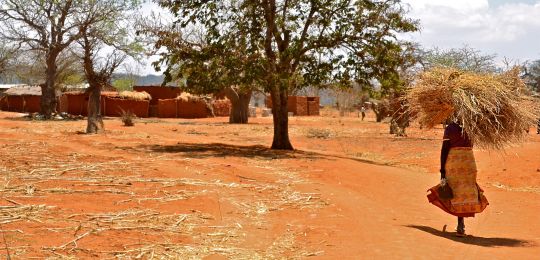By Philippine Sutz (IIED), LEGEND Core Land Support Team
This blog was produced for the LEGEND Land Policy Bulletin. Land: Enhancing Governance for Economic Development (LEGEND) is a DFID programme that aims to improve land rights protection, knowledge and information, and the quality of private sector investment in DFID priority countries.
Women account for nearly half of the world’s farmers and grow much of our food and yet their access to and control over land in many low and middle-income countries remains highly limited. This issue of the LEGEND bulletin focuses on gender in land governance, presenting highlights from recent research and taking stock of new initiatives.
Women account for nearly half of the world’s farmers and grow much of our food, according to the UN’s Food and Agriculture Organisation (FAO) — and yet their access to and control over land in many low and middle-income countries remains limited and fragile. Growing pressures on land and rapid socio-economic changes are further undermining this. Land is central to women’s empowerment — access to and control over this resource enables them to earn higher incomes, as well as improve their nutritional and educational outcomes.
The promotion of gender equality in land relations has never had as much global political support as it has today. Target 1.4 of the newly adopted Sustainable Development Goals (SDGs) aims to ‘ensure that all men and women, in particular the poor and the vulnerable, have equal rights to economic resources, as well as access to basic services, ownership and control over land and other forms of property(…)’ and target 5.a aims to ‘undertake reforms to give women equal rights to economic resources, as well as access to ownership and control over land and other forms of property(…) in accordance with national laws’. The UN’s Voluntary Guidelines on the Responsible Governance of Tenure of Land, Fisheries and Forests (VGGT) also affirm the principle of gender equality and spell out its implications. Ever more countries’ constitutions and laws also formally support gender equality. However, shortcomings often affect implementation, and fine-grained analyses and practical tools are needed to translate policy statements into real change.
This issue of the LEGEND bulletin focuses on gender in land governance, presenting highlights from recent research and taking stock of new initiatives. The ‘In Focus’ contribution explores the gendered impacts of agricultural investments and provides recommendations for designing gender-equitable land-based investments. Other contributions explore inclusive approaches to women’s participation in land-related decision-making and how to mainstream gender in land administration and in collective land tenure initiatives.
Overall, these contributions confirm that deeply ingrained socio-cultural practices and power imbalances play a major role in undermining women’s access to, use of and control over land. Tackling gender issues therefore raises some of the most difficult challenges in development interventions.
In order to tackle such challenges, practitioners underline the need for concerted efforts at different levels — from gender-sensitive legal reform and legal empowerment for women, through to training, awareness-raising and inclusive dialogue at local and national levels, all the way to testing new approaches to land governance programmes. Learning lessons from innovation is essential for maximising impacts and pushing policy agendas forward.
For more information contact the Legend Core Land Support Team at legend@odi.org.uk


